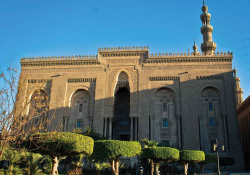The Wig

Banned from entering soccer stadiums since Iran’s 1979 revolution, the young women in this story hatch a risky plan to get inside the stadium on game day.
She had woken up at dawn feeling woozy and hadn’t been able to go back to sleep. All through the night she had been having confusing dreams. As she began to describe her dreams at breakfast, her mother cut her short and said, “You must have had too much to eat!” Mother whispered under her breath: “God willing it may be all right. It is all because of these horrible disgusting films you watch.” Father stared at her face for a few moments. He raised his shaggy eyebrows and didn’t say anything.
Mother said, “We are always worried to death wondering what you are up to.”
Nastaran knew that, since last night, Mother’s feelings had been hurt. Last night was their weekly gathering. Nastaran would get together with Shahla and Mitra and a few others and watch a film. This was the moment when the Kenyan mothers, after nine months of hunger strike, had torn their clothes and displayed their bare breasts to the camera. Mother, shocked and astounded, looked at the women’s hanging breasts with her eyes almost coming out of their sockets. As she started to say something, the girls, all together, started to cry. Mother’s grumbling and the girls’ sobbing mingled, and nobody understood what mother had been muttering under her breath.
Nastaran cleared the table and sat close to the television. She was looking at the two sides of the stadium that were completely occupied. The sound of horns, the shouts of the spectators, the shouting of slogans, and the singing of chants echoed all over the stadium.
Mother turned the television off.
“Aren’t you ashamed of yourself? When we were your age, girls would have had two children already, and you spend your time watching football.”
“I’ve done my work,” Nastaran said and then stood and turned the television on.
“If you have finished your homework, you can go into the kitchen and see the unwashed dishes waiting in the sink.”
“Aren’t you ashamed of yourself? When we were your age girls would have had two children already, and you spend your time watching football.”
Nastaran didn’t move from where she was sitting. She was waiting for her mother to move away from the television. Father said very loudly from the other side of the room: “Didn’t you hear what your mother said? Is she talking to a brick wall? Get up now.”
“I already told Mum I’ve done my homework.”
“Then go and help your mother. Come on, get a move on. If you touch that damned television I will break your hand, do you understand?”
Mother, too, was a girl in this house.
Father began shouting and, looking toward the kitchen, said to the woman: “It is your damned fault for having brought her up like this. In our family no stupid girl dares to disrespect her father. You will eventually drive me from this house, go away . . . go away.”
The sound of running water and the clatter of dishes came from the kitchen. Mother turned off the tap and said in a hardly audible voice, “What is the matter with you? Destroying our reputation; the whole neighborhood can hear you. Come on, get up, and let’s go to the supermarket and do some shopping. I can’t carry everything on my own; it hurts my shoulders.”
Then there was the sound of the door closing behind them, followed by total silence.
THE ROAR OF AN AIRPLANE and the doorbell brought Nastaran into the courtyard in her slippers. She looked longingly up at the airplane. She wished she were one of the passengers in that iron bird going somewhere far, far away. Where? Anywhere.
She opened the door to the girls. She took the bags they were carrying and together they went in. Shahla spread herself on the sofa and said, “What is it about choosing a color while you keep on finding excuses about it being long or short? All you have to do is to shave it off and it is all done and dusted; wear a Nike T-shirt over your trousers and nobody will ever know you are a girl.”
“If I shave my head what can I tell my father?”
“I don’t know. Tell him you decided to shave your head out of sympathy and love for these children suffering from cancer. Like that, he will even be proud of his daughter!” Mitra replied.
All three of them laughed loudly. When somebody rang the doorbell, Nastaran was taken aback. “It’s Vanik,” said Mitra.
“How does she know my home address?” Nastaran asked.
Mitra ran to the door. Shahla said, “Mitra asked her to come here. She also gave her your address. We forgot to tell you.”
As soon as Vanik was inside the house, Mitra said, “We don’t have boys’ wigs! Are you kidding me?”
“Well,” Shahla asked, “if a girl wants to fool people by appearing as a man, what do you have to offer?”
“If I were you, I would put a knitted cap on my head, wear a green pilot jacket, and get on with it. And by the way, what do men have that you want to copy them?” Vanik answered.
“Nothing, they don’t have anything, you stupid idiot,” said Shahla. “All we need is to get through the main entrance and it’s all over. Those soldiers, they are looking for knives, machetes, fireworks, and they search every orifice in your body; one way or the other we must.”
Vanik hid her face in her hands and suddenly burst out laughing. Shahla continued, “Do you think I am lying? To find these objects they put their hands here and there and everywhere. Why do you think poor Leila spent twenty night in detention last year? While she was being body-searched, the soldier’s hands slipped from under her arms onto her breasts.”
Vanik was worried about Nastaran. She and the other girls had all escaped. Only one of them had been lucky enough to escape inspection, and that was tall Maryam. Despite being twenty-one, her breasts hadn’t fully grown. She was thin and unusually tall. They said she had some kind of strange illness; that she was both man and woman at the same time, but the girls couldn’t understand what it was all about. How could anybody possibly be both a man and a woman at the same time?
“Anyway,” Vanik said, “I only have these wigs.”
“Take the black one,” Mitra said, “the one like the crow’s feather; you can tie your hair under it, and after we use the hair dryer, it will be done and finished!”
“What about yourself? All you do is tell me what to do,” Vanik replied
Mitra reached for her head and removed her wig. She had shaved her head so closely that her white skull was shining.
Both Vanik and Shahla looked astonished. Nastaran looked at Mistra’s white skull in shock and amazement. Shahla spread herself on the sofa. “You devil!” she said. “I had no idea whatsoever that it wasn’t your own hair.”
“Hey you, what if we get caught?” Nastaran asked.
Mitra answered sarcastically, “Our mums will gather in front of the detention center; nine months’ hunger strike.”
“Our mums’ next move,” Shahla said, “would be to tear their clothes and bare their breasts in public!”
The sound of the girls’ laughter filled the room.
MOTHER SLAMMED THE refrigerator door shut. “Why is it that you make such a fuss whenever she does something wrong? Everyone in your family is perfect and it’s the same when she gets top marks for her work, but all the stupid and dim-witted ones belong to my family? It’s an old saying that says everyone takes after their father. She’s taken after you, my dear, after you. The girl has turned out just like you, a dirty pervert. Last night she was sitting with other girls watching a group of naked women on television.
Father is banging on the door hinge with a hammer; it seemed he had been listening to everything in between banging the hinge. But then, as if he hadn’t heard clearly, he said: “Where have there been naked women for me to watch? The woman is talking nonsense.”
“This girl asked you two years ago to let her go and do sports, but you wouldn’t let her. If you had let her go, she wouldn’t spend all day sitting in front of that damned television. There are twenty or so girls wearing chadors and head scarves in that sports hall, running after a ball! What was wrong with that was that you stopped her; and now we have to confront and stop her from watching naked women?”
“How dare she do these kind of things? Did Ghazaleh do stupid things like that when she was at home? And how old were you when I came and asked you to marry me?”
“I made a grave mistake; they won’t make those kinds of stupid mistakes.”
“Whatever now. She hasn’t married anyway. She should get on with her studies and maybe someone will come and knock on this door and take her away and we’ll get rid of her before she does some serious mischief.”
AT THREE O'CLOCK Nastaran had arranged to see Shahla a couple of streets away, on the corner of Saberi alley. If she didn’t get a move on, she would be late. Without attracting the attention of her parents, she put her rucksack over her shoulders and left the house. Shahla was waiting for her. After Mitra arrived, they took a taxi. All the way to Vanik’s house, there was silence.
“How many hours before it starts?” Vanik asked, once the girls arrived.
“At six o’clock the referee will blow his whistle.”
Vanik lit a cigarette. She stood up and opened the window a little, blowing out the smoke. Turning to Nastaran, she said: “You should shave your head, too. Try to get your father’s sympathy through these child cancer sufferers. And if he objects, tell him the children’s prayers will be your salvation.”
Mitra came out of another room wearing boy’s clothes, stood in the middle of the hall, turned around, and asked, “Is this okay?”
There was the sound of thunder and lightning. It was growing dark outside.
“If I’m not mistaken, it’s now raining in Karaj,” Vanik said.
The girls sat on the sofa huddled up to one another.
IT WAS A SHORT DISTANCE to the ticket kiosks. On both sides of the eastern side of the stadium two long queues had already formed, of men carrying horns and blue and red flags as they approached the kiosks. They were shouting, egging each other on and swearing.
Shahla was standing ahead of Nastaran in the queue. Nastaran was very close to Shahla, and as they moved forward every few steps, Nastaran was trying to put a little distance between herself and the man behind her. The man was looking at the red line Nastaran had drawn with rouge on her cheek. “Haven’t you brought a flag with you?” he asked.
Nastaran shook her head, indicating she didn’t have a flag.
“Has your face been cut by a knife?”
Nastaran nodded, confirming the knife wound. Mitra made her voice sound like a man’s and said: “Our friend here has a toothache and can’t talk. Don’t worry about him. If you want, you can come and stand in front of us.”
She then changed places with Nastaran, putting herself between Nastaran and the man.
When they reached the ticket kiosk, once again Mitra took Nastaran’s place and bought two tickets. At the entrance, everybody was being searched. Mitra put her hand around Nastaran’s neck and whispered in her ear: “Don’t mess it up now. Why have you turned white? Like this we will be found out and we will be fucked. Laugh a bit, shout, shout loudly for the reds!”
“I can’t. I can’t breathe properly. For God’s sake, let’s go back.”
“What, now? Now there’s no way we can go back. Even if we want to leave now, we have to get in and then leave from the exit. Why are you so pale? Oh, my God, you are going to expose us; we are being exposed! Don’t say anything. Keep your head down and be quiet and follow me, and everything will be fine. For God’s sake, don’t spoil it all, Nastaran. For heaven’s sake; only these ten, twenty meters and once we get past, it will all be over. Once we are in, nobody pays any attention to anybody. Once we get in, you can go into the bathroom and wash your face; you can even take your wig off; nobody will have any suspicion that you are a girl. Come on, start shouting.”
Nastaran stopped and said a few times very loudly: “Go red go, go reds go!”
A few young men and boys followed Nastaran and repeated what she said. Mitra clasped Nastaran’s hand. Nastaran became a little more lively.
A few soldiers and petty officers were searching people, one by one. Shahla and Vanik were ahead of them. Nastaran hesitated and stopped. Mitra got hold of her hand and pulled her forward. They were separated. The solider searched Mitra very hurriedly and casually and said, “Go ahead.” Then he pointed at Nastaran to come forward.
Nastaran took a step forward. Mitra said, “Officer, he is my friend, and he is deaf and dumb.”
The soldier beckoned to Nastaran to move farther forward. Nastaran didn’t move. She turned and looked behind her. She pushed a few people aside and began to run.
The soldier beckoned to Nastaran to move farther forward. Nastaran didn’t move.
The soldier shouted, “She’s a girl . . . She’s a girl . . . Arrest her!”
NASTARAN WAS RUNNING very fast. Shahla and Vanik were watching from a distance. Mitra was shocked and unable to move. They saw how Nastaran stumbled a few times. Three or four soldiers were running after her. They couldn’t see Nastaran anymore because of the crowd; she had disappeared from view. Somebody from the crowd shouted, “Is it an offense to God if they come to watch football?”
Somebody from the crowd shouted: “Is it an offense to God if they come to watch football?”
The siren of a police car cut off the man’s voice. Mitra, following the uproar, took her wig off and put her knitted cap on. All three of them began to run after the police car. Out of breath, they reached a group of people who had gathered around a fire engine. The red light of the police car and the red color of the fire engine had turned the dusk to red.
Mitra looked at a young man who was making his way toward the stadium. “What happened?” she asked him.
“Some jerk tried to catch her and pushed her,” the young man said. “The poor girl fell and hit her head on the fire engine’s bumper.”
Mitra went forward. She could see Nastaran’s cracked skull and the blood running from her head onto the ground. By the time Shahla and Vanik reached Mitra, the sound of the ambulance’s siren was fading away.
When the girls heard the sound of the horns and the cheering of the spectators, they turned and looked at the stadium; the traces of blood could be seen all the way to the entrance gates.
Potomac, Maryland
Translation from the Persian












